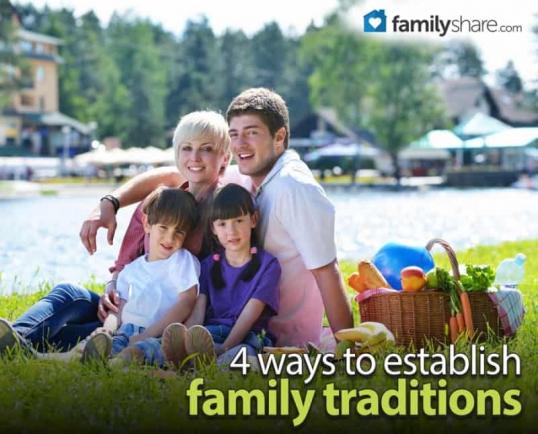
Our oldest daughter married at Christmas time. She was anxious to share with her new husband the traditions we had established to celebrate this special holiday. Unfortunately, since the wedding took place out of state from our home, we didn't celebrate in the accustomed way. Two years later, she wanted to be sure we did. She said to me, "I had told him all about the wonderful things we do, and we didn't do any last time. I want him to experience Christmas as I did growing up."
Tradition is the passing on of customs or beliefs from generation to generation. Traditions create the common denominator which helps define us a member of a unique group. My daughter wanted to share our traditions with her husband because they helped to define who she was.
Because a family begins with the blending of two different families, each new family will begin to establish their own unique traditions. These traditions may come from their own heritage, ideals, their own holiday celebrations, as well as their own faith.
1. Look to the past
One of the first places to look for traditions for your family is in your own heritage. My family has taken several traditions from mine. Every Sunday, we have roast beef, mashed potatoes, gravy and rolls for dinner. This meal actually began with my paternal grandmother, adopted by my own mother and now me. My children look forward to this every week.
2. Look to what is important to you
Traditions allow you to pass on the things that are most important to you to your children. If spending time with your children is important, then build traditions around that. For example, some families have traditions of father-child or mother-child outings. These could include taking a child fishing, camping, shopping, out to dinner or to the movies.
3. Look to holiday celebrations
Holidays provide excellent opportunities to create family traditions. Our family loves the Christmas holidays. We have many traditions built into our celebrations, from reading Charles Dickens, "A Christmas Carol," to baking cookies to deliver to neighbors. Every Christmas Eve, we celebrate with a feast of Mexican tamales, enchiladas and rice. Originally, this was shared with family. However, once we moved away from family it became a tradition to invite other families far from their homes. Once the feast is over, the children re-enact the Nativity.
4. Look to your faith
Perhaps, some of the most important traditions you will create with your families will be based on your religious faith. Lori Copeland who wrote "The Christmas Lamp" said the following about tradition: "Tradition doesn't have to be logical; it only has to emphasize the light of Christ and his everlasting love." Take the time to establish traditions around your religious practices, such as family prayer, family scripture study and church attendance. These types of traditions will bind your family to one another as well as to the Savior.
The Dalai Lama said, "All major religious traditions carry basically the same message, that is love, compassion and forgiveness ... the important thing is they should be a part of our daily lives." When your children see you implement these values in your daily living and as a part of your family activities and living, they will be embedded into their character. Growing up, my family learned of compassion through traditions such as helping a less fortunate family at Christmas. Our family now has learned this through our assisting a refugee family in getting established.
Traditions become established as you place importance on the activity, meal or event. These traditions bring cohesiveness to your families that help each member to feel part of a greater whole. Through traditions, you have the means to pass on your beliefs and faith.

